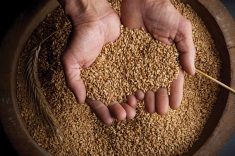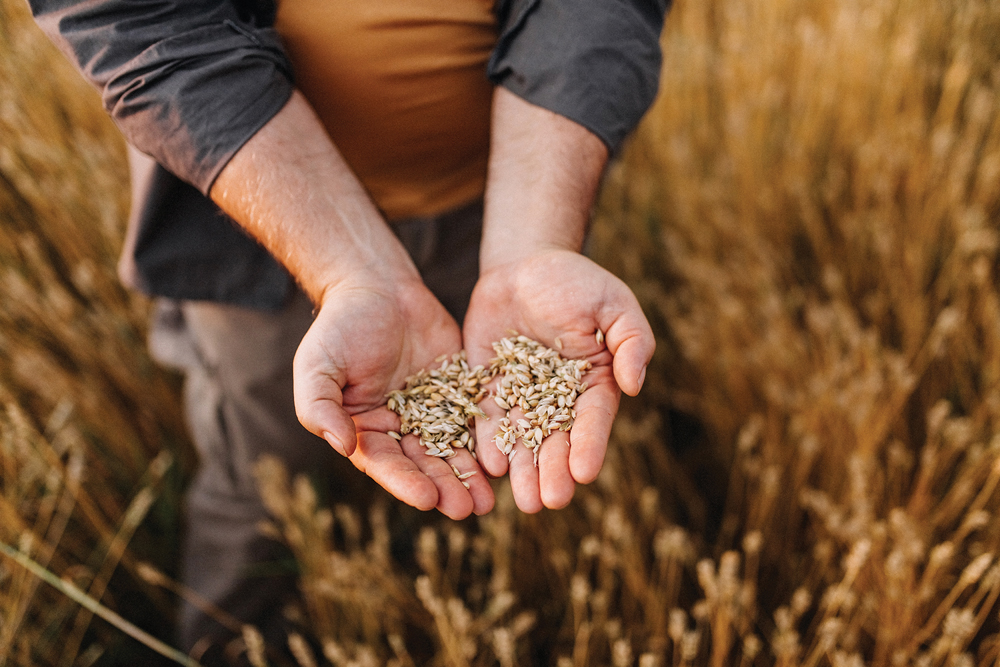[UPDATED: Jan. 31, 2022] Seeds Canada is hosting an online Seed Summit next month, even as the federal government’s own regulatory review forges ahead.
“It’s just including more of the stakeholders that haven’t been included before,” Seeds Canada’s executive director Barry Senft said in an interview Jan. 19 (register at seedsummit.ca).
The summit’s announcement in November raised a few eyebrows since the Canadian Food Inspection Agency’s (CFIA) Seed Regulatory Modernization (SRM) process, which started in September 2019, had gone to great lengths to include a cross-section of stakeholders, including farmers represented by the Canadian Federation of Agriculture, Grain Growers of Canada and Union des Producteurs Agricoles.
Read Also

Spoken questions are what make it an interview
Recently, I was exchanging emails with the media email account at a government agency, hoping to reach a source for…
Senft denied the summit was an attempted end run on the SRM process to promote changes seed companies prefer over what seed growers and farmers want.
Seed industry complexity discourages participating, he said. Moreover, the grain industry and seed business have changed since the last time seed regulations were reviewed, mainly because of new technology.
“We need our seed development regulations to keep up that pace,” Senft said.
Why it matters: As changes to seed regulations are being discussed, there are differing visions on the future roles of seed growers, seed companies and federal regulators.
There’s some tension underlying the SRM process. The Canadian Seeds Growers Association’s (CSGA) 3,300 members voted overwhelmingly Sept. 4, 2020 not to merge with four other seed organizations, including the Canadian Seed Trade Association, representing seed developers and retailers, to form Seeds Canada a year ago.
Each have differing SRM visions.
CSGA has the statutory responsibility to certify Canadian seed crops assuring their varietal identity and purity, but proposes its authority be expanded to include certification of Foundation, Registered and Certified seed.
In contrast, Seeds Canada wants other organizations to be able to certify seed crops.
In the past some of the large seed development companies, now members of Seeds Canada, have complained Canada’s variety registration system is a barrier to quickly introducing new varieties. But registration, and other seed regulations, were implemented to ensure Canadian seed quality and protect producers from fraud.
The CSGA sees variety registration as key to quality control.
“It represents a unique strategic advantage for Canada,” CSGA executive director Doug Miller said in an interview Jan. 18. “We’re not the biggest player on the market. This is a tool that we can use to provide transparency to trading partners.
“At the same time is it perfect? No. There are opportunities for modernization and that’s what we’re pushing for through the task teams.”
CFIA says it’s open to less regulation if appropriate.
“We really want to introduce some flexibility and to make changes that keep pace with the advances in the industry,” Wendy Jahn, national manager of CFIA’s seeds section said in an interview Oct. 5, 2021.
“The reason we have signalled that we are open to examining the role of government is that we want to make sure that what we do… brings value,” she said.
“But to make decisions you need to hear from the producer community that’s impacted by this because they are the consumers of seeds.”
Asked if Seeds Canada wants deregulation, Senft replied: “I think what Seeds Canada wants is common-sense regulation — regulation for a purpose that takes into consideration all aspects of it.
“One needs to realize that our farmers compete in a global situation and access to the latest and greatest (varieties) is important. But that means common-sense types of regulations.”
SRM is a different process than usual, Jahn said last year. Instead of CFIA coming up with proposals for regulatory changes and then consulting, it invited stakeholders to help develop proposals.
“This time we’re having our regulated parties, and our consumers of seed, at the table, at the same time in the development of this,” Jahn said. “Of course we are going to go there and do our broad-based stakeholder consultations, but hopefully we’ve developed these proposed amendments collectively so if we are able to achieve compromise among these different stakeholder groups it should reflect a compromise that, hopefully, works for everybody.”
While Seeds Canada’s summit is not a formal part of the SRM process, information that comes from it will feed into it, CFIA said in a Dec. 15, 2021 email.
“Seeds Canada has said that it will plan and host a Seed Summit to provide input to the working group and the Government of Canada regarding direction for Seed Regulatory Modernization,” the email says in part. “Both the (working group) and the government are looking forward to this dialogue and to hearing the output of the process.”
CFIA repeated the Seed Regulatory Modernization initiative is designed to hear from seed stakeholders.
“We have a process in place that will allow us to get balanced input from affected sectors of the seed system,” CFIA’s email says. “This includes our working group which will provide strategic direction and the task teams, which are taking a deeper dive into specific subject areas to provide us with more tactical information. The recommendations we get from the working group and task teams will help the CFIA to bring proposals forward for broad-based stakeholder consultation.”
The SRM process is a “once-in-a-generation” review of the Seeds Act and regulations that could result in “substantive change,” affecting the seed industry, farmers and crop end-users.
The objectives are to improve system consistency, reduce complexity and strengthen consumer protection for farmers and crop users, Jahn said last year.
The whole seed system, which many agree is key to Canadian grain quality, including pedigreed seed certification, common seed and variety registration, are being scrutinized.
The current legislation started with the Seed Control Act in 1905, proclaimed a year after the CSGA was founded.
The act was amended in the 1920s to help protect farmers from unscrupulous seed sellers with measures including variety registration.
Although seed regulations have been updated “we haven’t had a holistic look at them for about 30 years now,” Jahn said.
Given the potential for big changes, CFIA wants to be sure the seed sector, and those affected by it, have a say in how to improve it, especially farmers who rely on seed, she said.
Jahn said if all goes well farmers will be consulted on possible seed regulatory changes in the winter of 2022-23.
The government hopes to post its proposed regulatory changes in the fall of 2023 in the Canada Gazette Part I, she added.
That’s a requirement before regulatory changes are implemented.
CSGA will participate in the summit being held online Feb. 7, 14 and 22, but will not partner with Seeds Canada due to limited resources, Miller said.
“For us we’re really investing and doubling down on the CFIA SRM process,” he added. “It’s the official one and that’s where the key discussions will be.
“We fully support the existing process. It has the right stakeholders, a very diverse set of stakeholders and that has led to a robust discussion. These groups have not left any stone unturned. They are having the tough discussion these task teams. As an organization we are standing behind the existing process. That’s where we are going to throw our resources but we are going to be at the summit as well and pitch in there.”
And like CFIA, CSGA says the summit is opportunity for stakeholder consultation.
“There’s nothing wrong with that,” Miller said.
Meanwhile, CSGA and CFIA were to provide an update to seed growers on the SRM process during a SeedTalk Prairies webinar Jan. 26. While it’s not CSGA’s version of a Seed Summit, the association will explain some of the changes CSGA is seeking to seed regulations, including a greater role for CSGA, Miller said.
“It’s about the CSGA stepping up and taking on a bigger leadership role in the Canadian Seed Certification system,” he said.
Asked about lingering hard feelings between CSGA and Seeds Canada Miller said: “At a high level there is a lot of mutual respect between the two organizations.”
Senft, who joined Seeds Canada June 1, agreed, noting he and Miller have discussed SRM issues.
“Absolutely there is respect for CSGA, it’s just not the environment that people thought might happen two or three years ago (when merger discussions were underway),” Senft said.
He also agreed with observers who say, the seed sector must find common ground.
“Yeah, absolutely,” Senft said. “Everybody plays an important role in seed development. It’s not an issue of an either or.”
CSGA’s recommendations for Seed Regulatory Modernization
Here are the Canadian Seed Growers’ Associations recommendations on Seed Regulatory Modernization. (For more detail, visit the Seed Regulatory Modernization page at seedgrowers.ca).
1. The CFIA should continue to be ultimately responsible for the seed certification program.
2. The CSGA’s delegated authority should be expanded to include certification of Foundation, Registered and Certified seed.
3. The Seeds Regulations should recognize CSGA to establish technical requirements for seed certification in Canada.
4. The seed certification system should be digital end to end to facilitate single-window access to seed regulatory services.
5. Variety registration should be maintained, and the CFIA should continue to be responsible.
6. Schedule III to the Seeds Regulations should be incorporated by reference and updated, with the CFIA as the responsible authority.
7. The current requirements concerning the use of variety names should continue.
8. The CSGA should administer the Variety Profile Platform in support of enhanced transparency for the agri-food system.
9. Part IV of the Seeds Regulations should be incorporated by reference.
10. Common seed of cereals, pulses, and oilseeds should be subject to strengthened regulation and meet minimum standards for purity and germination.
11. Common seed of small-seeded agricultural crop kinds should be sampled, tested, and graded by people authorized to do so, as currently done for pedigreed seed.
12. The CFIA should increase its investment in science support for the Seed Program, commit to continued engagement in international standards development organizations, and commit to succession planning to ensure that appropriate and adequate human resources are available.
Seeds Canada’s principles on Seed Regulatory Modernization
Here are Seeds Canada’s principles on Seed Regulatory Modernization. (For more detail, view this PDF at seeds-canada.ca)
1. A diverse and inclusive seed sector-led and government-enabled partnership.
a. The primary priority for the government should be to protect the health and safety of plants, animals and humans and the environment they live in.
b. Outcome-based labelling requirements should be used to protect the customer by providing fit-for-purpose information.
c. Efficient international trade should be enabled.
d. Where applicable, the government should have the legal authority for all official seed tags.
e. Responsibilities should only be transferred to the seed sector following a cost-benefit analysis and industry consultation.
2. A system that supports certified seed and delivers value for the seed sector and its customers.
3. A regulatory framework that enables choice and is open, competitive, and accessible to all seed sector participants.
4. An approach that is responsive, agile, and adaptable and easy to use and navigate.
5. Regulations that foster innovation, growth, diversity and inclusivity and support continuous improvement.
Stakeholders represented on the Seed Regulatory Modernization working group
Seed Industry organizations:
- Seeds Canada
- Canadian Seed Growers Association (CSGA)
- Authorized Seed Crop Inspection Services (ASCIS)
Farm groups:
- Canadian Federation of Agriculture (CFA)
- Grain Growers of Canada (GGA)
- Union des Producteurs Agricoles (UPA) or Producteur de Grains du Québec (PGQ)
Value chain associations:
- Pulse Canada
- Canola Council of Canada
- Canadian Horticultural Council
- Canadian Potato Council
Public breeders:
- Crop Development Centre (USask)
- Agriculture and Agri-Food Canada (AAFC)
Other:
- SeedChange
- Canadian Organic Trade Association
*Updates: a previous hyperlink indicated that the information was sourced at the Seeds Canada website when it was the CSGA website. A mention of CSGA’s statutory responsibility was also clarified.
















